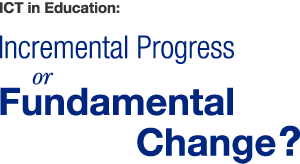Seymour Papert set the stage for the Symposium through his address to
delegates of the EU Presidency conference, "New Futures for Learning in the Digital Age".
He said he may call his book-in-progress, Fiddling While Rome
Burns - which is "exactly what the world’s doing about education. We�re
all meddling with details, tinkering here and there with a
system which is about to collapse." Dr. Papert criticised resistance to
change and called for curricula focusing on new knowledge, such as
ideas in computation and progress in mathematics.
What makes our century’s science thinking different from any other
century are the ideas associated with computation, computers and
information science, and the idea that we should give children this
powerful thing they care about more than anything else, that they ought
not to know what goes on inside it - it blows the mind�
Wild imagination, passion, being close to nature, and believing in
magic - that is what we need. I think these are all elements that we
need to bring into the otherwise cold version of use of computers
called "ICT." I hate that, I really hate that name�
Maybe in small places, less dominated by big bureaucracies, you can
make changes happen more easily� It’s in Maine, where I live at the moment and where we�ve been
able to take the lead in the United States in bringing about the
material basis for bringing a real culture of digital means and digital
learning into our schools � that Maine would be the first state to
adopt the idea of a computer for every child, although it�s the 40th
state in income, is I think very significant. I think from Ireland and
maybe what we heard from Estonia � often the smaller place that thinks
of itself as a developing country is the one where development can
happen. Whereas the countries that think, �We are developed,� are too
arrogant to open the door to real change. - Seymour Papert
In her address to the delegates, Carol Strohecker
described a project that is demonstrating change for students, teachers, and schools in Ireland.
|




